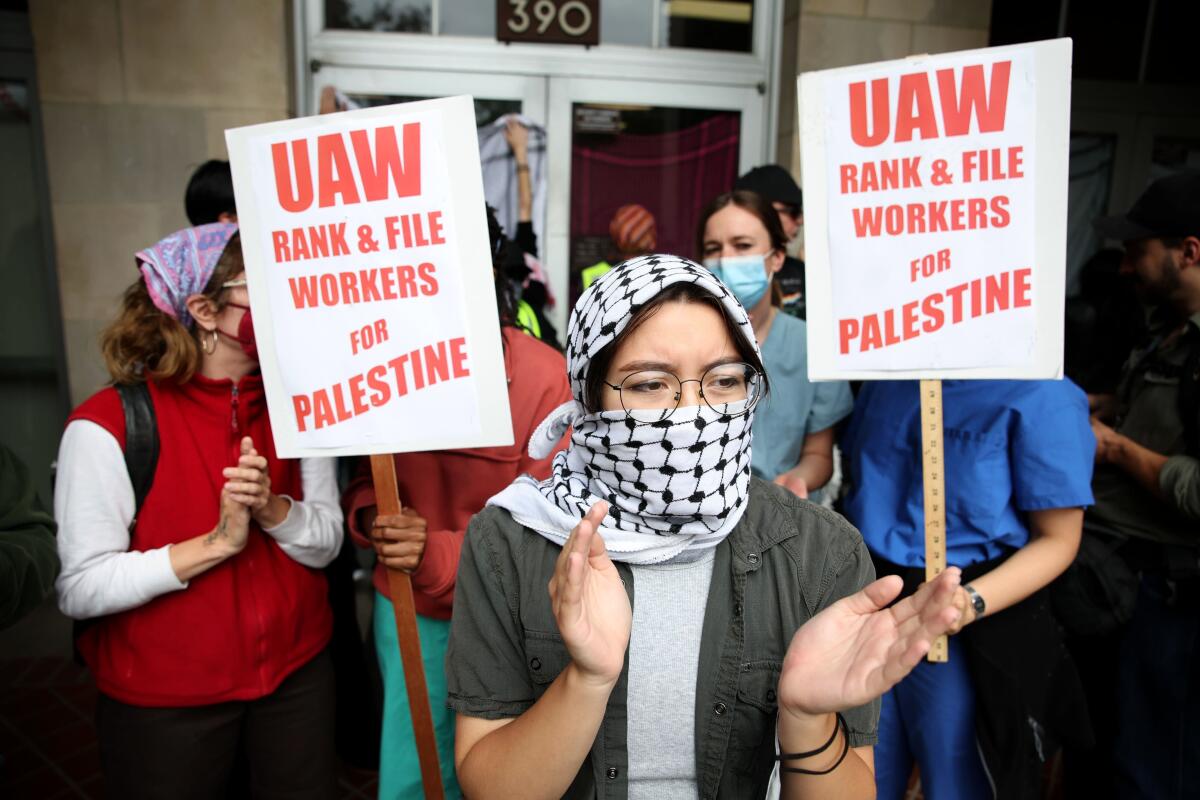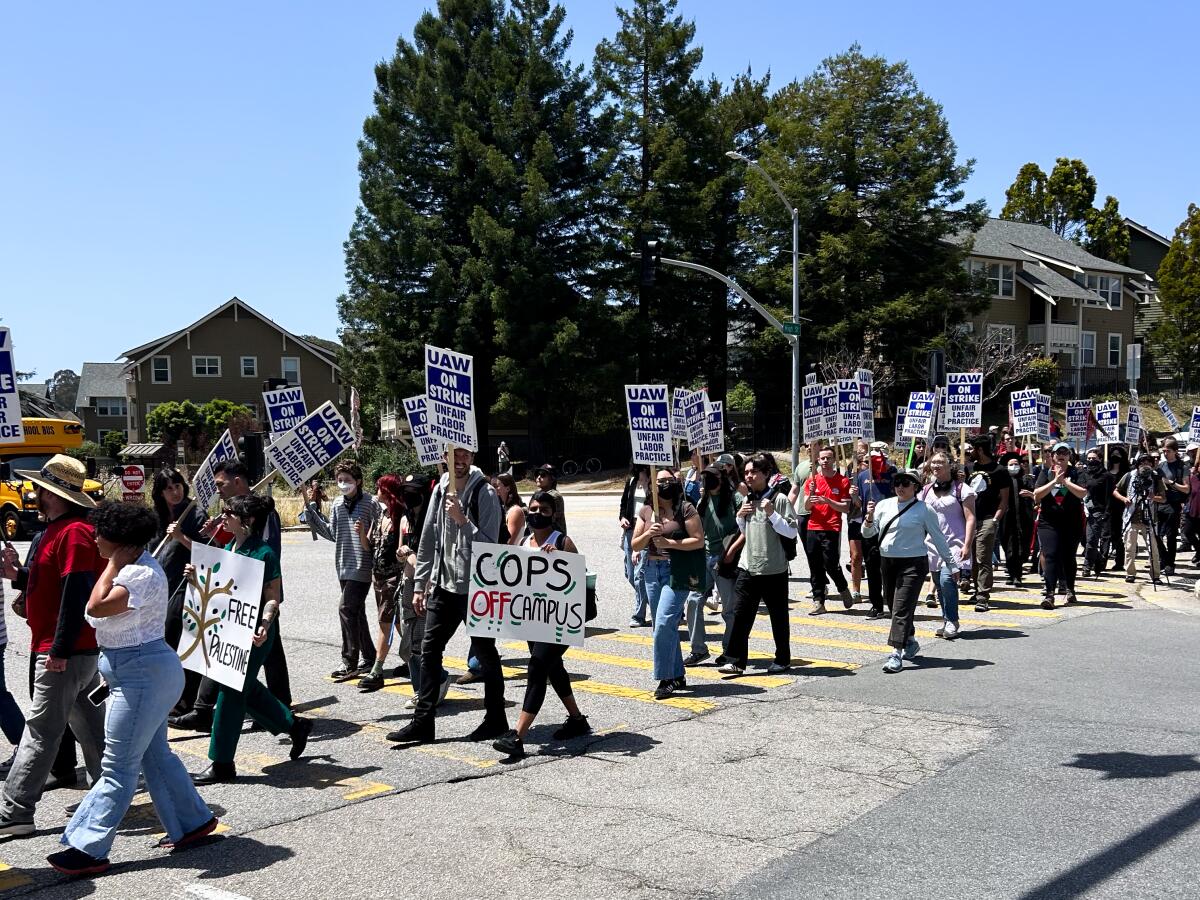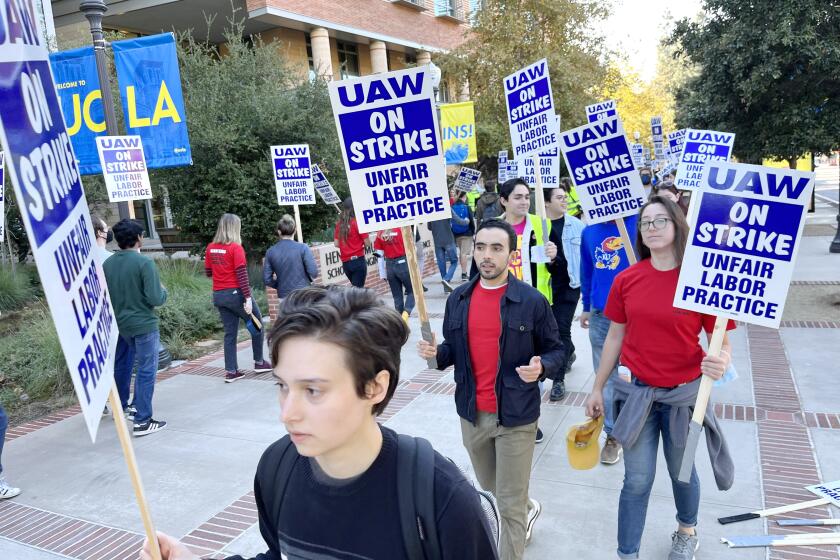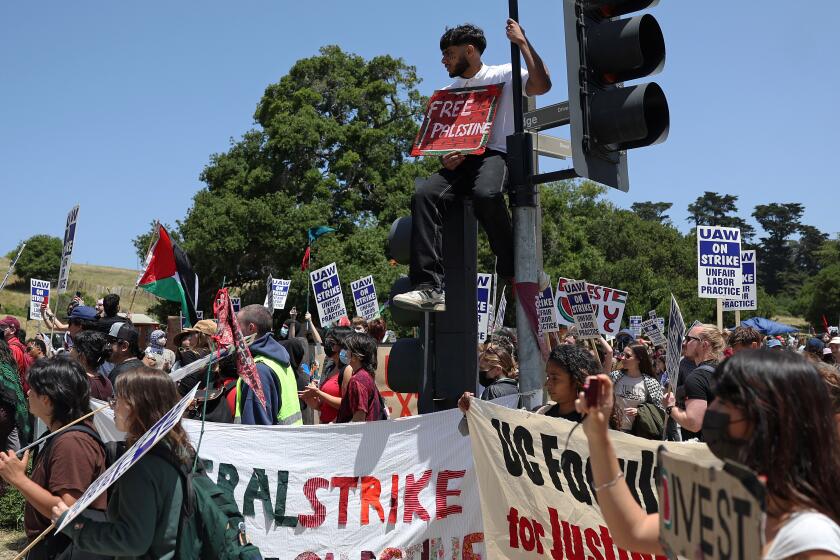UC worker strike to hit UCLA, Davis next. A looming question: Is this walkout legal?

- Share via
The University of California academic workers’ strike is expected to amp up Tuesday with walkouts at UCLA and UC Davis after a state labor board declined to immediately stop it, ruling that a university complaint did not meet the legal standard required for its intervention.
UC officials had claimed that the walkout was illegal and causing such serious harm that it needed to be stopped.
The union representing 48,000 academic workers called the strike over alleged free speech violations related to Israel-Hamas protests and other harms to workers. The strike began Monday at UC Santa Cruz under a union plan to take the walkout to different colleges at different times in the 10-campus system.
While labor officials did not stop the walkout, the legality of the strike remains a pending issue before the labor board, with a ruling at least three weeks away.
The union on strike, United Auto Workers Local 4811, represents graduate student teaching assistants, tutors, researchers and other academic workers at UC campuses and Lawrence Berkeley National Laboratory. The labor action comes at a critical time in the academic year, as classes end and capstone projects, finals and grading are ahead — work in which union members play a key role.
The union praised the Thursday ruling in a social media post:
United Auto Workers Local 4811, which represents 48,000 student workers in the University of California system, authorized a strike alleging their workers’ rights were violated in actions against pro-Palestinian protests.
“Injunction against the UC strike DENIED. UC has had many chances to resolve its egregious ULPs [unfair labor practices] and it has thus far refused to engage. Now two more campuses are walking out. UCLA and UC Davis — it’s time to Stand Up.”
Issues at stake
The academic workers contend their strike is legal under rules that permit walkouts in response to unfair labor practices. In a filing called an unfair practice charge, the union alleges that workers’ free speech rights were violated when system leaders called on police to remove pro-Palestinian encampments at several campuses and activists at UCLA were not protected from an attack by pro-Israel supporters for hours. Police later moved in to dismantle the UCLA encampment, making about 200 arrests, including some members of the striking union.
A majority of voting union members authorized the strike, which could last till June 30.
The union is demanding that UC officials negotiate with pro-Palestinian demonstrators, stop actions hostile toward nonviolent activists, grant amnesty to those facing disciplinary action related to the unrest and divest from “weapons manufacturers, military contractors, and companies profiting from Israel’s war on Gaza.”
UC officials had asserted that the labor action was illegal because of a no-strike clause in the union contract and had sought a court injunction from the California Public Employment Relations Board to immediately halt the strike. Also, UC said, the strike is unlawful because the goal is “to pressure the University to concede to a list of politically motivated demands closely linked to the protests occurring across California and the nation.”
UC officials said they support free speech but that union negotiations “must be tied to terms and conditions of employment and terms in the collective bargaining agreement.”
“We’re glad PERB has rejected UC’s latest demand for special treatment under the law,” said Rafael Jaime, the president of UAW 4811. “UC has allowed members of the academic community to be brutalized by violent agitators, and called in police to trample on our members’ rights in direct contradiction to UC’s own policies. Our workers have walked off the job to demand resolution of these brazen unfair labor practices. PERB’s decision to deny their request for an injunction proves that no employer gets to make up its own rules.”
What UC says
While UC had hoped for immediate intervention, officials on Friday acknowledged the effort involved high legal hurdles.
“Because injunctive relief is issued before PERB’s process is complete, it is an extremely high standard that requires a showing of irreparable harm,” the university said in a statement provided by spokesperson Heather Hansen.
The university also sharply disagrees with the union’s characterization of its actions as condoning violence and trampling on rights — although in testimony before the U.S. Congress on Thursday, UCLA Chancellor Gene Block said the university made mistakes.
In his opening testimony, Block said that a pro-Palestinian encampment “disrupted normal access to some classes” and “impeded our educational mission” and that “we should have been prepared to immediately remove the encampment if and when the safety of our community was put at risk.”
UCLA has reassigned Police Chief John Thomas pending an investigation of security failures that left students and others in the encampment to fend for themselves against attackers for three hours on the night of April 30 before law enforcement moved in to quell the melee.
Academic workers walk out to support participants in the pro-Palestinian protests. UC officials call the strike illegal. It could spread to other campuses.
But none of these actions or events — or others cited by the union — amount to illegal mistreatment of academic workers by the university under California labor law, the university has contended.
In rejecting UC’s request to stop the strike, the labor board did not address the merits of the claims by either side, concluding simply that the university did not meet the threshold required for it to intervene.
“The Board presently declines to pursue an injunction as requested by Regents of the University of California (UC), as UC has not established that injunctive relief is ‘just and proper,’” stated the board’s letter, which was signed by general counsel J. Felix De La Torre.
The board left the matter open “in the event it learns of evidence or facts to support a finding that injunctive relief is just and proper.”
Legal battle not over
The board’s action does not end the legal battle over competing claims before the panel. Labor officials still must deal with the charges of unfair labor actions from each side.
In this area, the university on Thursday made incremental progress. On the issue of the legality of the strike, the labor board issued a complaint against the union, based on UC’s allegations. The complaint sets out that if the university’s allegations against the union are shown to be accurate, then the strike could be judged illegal.
“The University is pleased by this expedited action from PERB,” said Missy Matella, associate vice president for systemwide labor relations. “We have maintained from the beginning that UAW’s actions violate our mutually agreed contracts. We are eager to see a quick and just resolution to this matter so that our students, faculty and staff can end this academic quarter without further disrupting their education and progress towards degree completion.”
But the PERB action applauded by UC could prove a Pyrrhic victory in the short term — it does nothing to alter quickly the situation on the ground. Both sides have 20 days to submit documents in the case as the strike proceeds.
Campuses brace for impact
Shortly after the PERB decision was announced, UCLA officials sent an advisory on the pending strike to the college community.
“During the strike, those participating might cease aspects of their employment including teaching, grading assignments, tutoring, conducting research, administering programs and carrying out other work duties,” officials said. “We recognize a strike could have a significant impact on our students, and we are doing all we can to mitigate major disruptions to your academic experience.”
Ever since the Israel-Hamas war began last year, student protesters from California to New York have called on schools to divest. But administrators say it is not so simple.
The advisory states that on-campus demonstrations could continue but that protesters may not block vehicle or pedestrian access.
A notice also went out to the UC Berkeley campus community, warning that a strike could also soon take place there.
The union has not yet chosen Berkeley as a strike site.
“While UAW has not called for a strike at Berkeley at this time, [University of California office of the president] is asking all campuses to be prepared for potential activity should a strike be called,” officials said in an email. “Wherever strike action is called, it is expected to run throughout June. Managers and supervisors, please pass this information along to your teams.”

More to Read
Sign up for Essential California
The most important California stories and recommendations in your inbox every morning.
You may occasionally receive promotional content from the Los Angeles Times.















